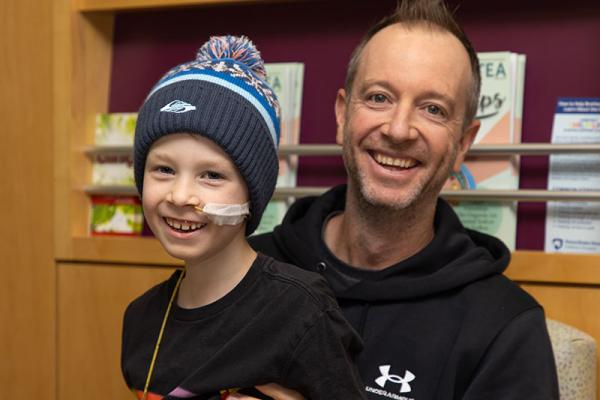
Neuroblastoma treatment reduces chance of relapse
By Jean Waverka
For the first 2 ½ years of Ford Bartle’s life, he was a typical toddler running at full speed. But in August 2019 a persistent case of constipation led doctors to a devastating diagnosis: he had stage 4 neuroblastoma.
The rare form of cancer develops primarily in children less than 6 years old. Neuroblastoma originates in immature nerve cells found in several areas of the body, most commonly in the adrenal gland and next to the spine. About 50% of patients already have advanced metastatic disease by the time they are diagnosed, when it has usually spread to the lymph nodes, bones, bone marrow and liver.
Ford’s diagnosis began a multi-year treatment journey that took him from his home in Pittsburgh to a major cancer center in New York City before his parents turned to Dr. Giselle Saulnier Sholler to aid in his treatment plan. She is chief of pediatric hematology and oncology at Penn State Health Children’s Hospital and the director of pediatric oncology research at Penn State College of Medicine.
“Neuroblastoma is one of our more challenging pediatric cancers. As in Ford’s journey, this cancer is one that continues to relapse. The goal of our therapy is to stop this cycle,” Sholler said. “This is particularly important for Ford given that few drugs reach cancer in the brain where his cancer is relapsing.”
Sholler had been on the Bartles’ radar because of her research into the drug eflornithine (DFMO) and its ability to reduce the risk of relapse for pediatric high-risk neuroblastoma patients - something that was especially important for Ford, who had relapsed in October 2021 and again in August 2023 despite long stretches of time where signs and symptoms of the disease had disappeared.
“When Ford relapsed [a second time], I was investigating our options and saw that Dr. Sholler had been hired by Penn State College of Medicine and was moving her clinic there,” said his father Bobby Bartle. “We thought it was a really good time for us to reach out to her, introduce Ford and get her thoughts on his treatment.”
Ford, now six years old, traveled with his parents to Hershey in November, shortly before DFMO gained U.S. Food and Drug Administration (FDA) approval. The drug was developed based on Sholler’s research and clinical trials she led through the Beat Childhood Cancer Research Consortium and is the first to prevent relapse in children with incurable neuroblastoma.
“She immediately connected with our doctor at Memorial Sloan Kettering, talked about our plan and decided we could put Ford on high-dose DFMO [in addition to his ongoing chemotherapy],” said Bartle, explaining they return to Penn State Health Children’s Hospital every three months for a follow-up visit and more medication. “He tolerates everything very well. Except for the fact that he has to travel to doctor visits and treatments, he lives life normally and doesn’t skip a beat.”
With FDA approval of DFMO, which was newly branded IWILFIN by US WorldMeds, all children with neuroblastoma have access to the drug.
“At the same time,” Sholler said, “our Beat Childhood Cancer Research Consortium is now moving forward with new research trials to continue to bring hope and new options for children with cancer.”
For the Bartles, additional hope lies in their connection to Sholler opening up the possibility of research and therapeutic trials through the consortium that could benefit Ford.
“We’re hoping that DFMO is exactly what Ford needs,” Bartle said. “But if that changes in two to three years, we’re excited that working with Dr. Sholler gives us access to new treatment options.”
One thing they do know is that they’ll never stop their pursuit of what’s best for their son.
“Throughout this whole experience, we've learned how to advocate for Ford and ourselves,” Bartle said. “We feel confident that we’re connected to the world’s leading doctors and know we’re getting the best treatment we possibly can for him.”





